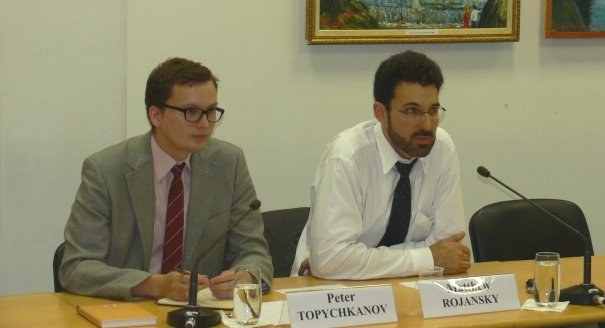Registration
You will receive an email confirming your registration.
IMGXYZ3872IMGZYX2012 is an election year for both Russia and the United States. Presidential elections have already taken place in Russia, and they will be held in the United States in November. It remains to be seen how these political changes might affect Russian-American relations. Matthew Rojansky, deputy director of the Russia and Eurasia Program at the Carnegie Endowment, spoke about how bilateral relations might change at an event hosted by the Carnegie Moscow Center. Carnegie Moscow Center’s Dmitri Trenin introduced the event and Carnegie Moscow Center’s Peter Topychkanov moderated.
Russia’s Significance for the United States
According to Rojansky, Russia’s significance for the United States is currently both small in economic and human rights terms and large on issues of European security. At the same time, Rojansky added, many Americans still retain their Cold War era skepticism toward Russia.
Russian-American Relations After the Breakup of the Soviet Union
- The Breakup of the Soviet Union: Rojansky explained that Americans perceived the breakup of the Soviet Union as a victory that had enabled the development of capitalism and democracy. In Russia, however, the breakup of the Soviet Union is perceived as a dark moment in the country’s history, and the subsequent chaos, corruption, poverty, and the diminished role of Russia in international affairs are viewed as a tragedy. Rojansky emphasized that in the years following the breakup, the United States frequently played the role of a donor to the new Russian Federation, which established an unequal relationship between Russia and the United States.
- Bill Clinton and George Bush: In 1993-2009, the United States and Russia no longer saw each other as adversaries, as they had during the time of the Soviet Union. While the presidents of both nations worked on developing bilateral relations during this time, Rojansky believed that the contacts were limited until the start of “reset” policies under Barack Obama.
- Barack Obama: A “reset” of relations with Russia was announced by the Obama administration after his inauguration in 2009. Obama called for pragmatism in interactions with the Russian Federation and for the creation of new public institutions to develop cooperation. Discussion of specific issues on both state and public levels—the so-called dual track approach—intensified between the two nations.
- The Current State of Affairs and Possible Prospects: Rojansky stressed that uncertainty still remains in Russian-American relations. However, he suggested that factors exist that could foreshadow a decline in the bilateral relations, such as U.S. efforts to increase its support for democracy and human rights in Russia, the debate on the Jackson-Vanick amendment, the protests during Vladimir Putin’s inauguration, and Putin’s absence at the G8 Summit in Camp David.
The Influence of the U.S. Elections on the Bilateral Relations
- Obama’s Victory: If Obama wins the presidential elections, it will most likely mean that Washington will continue to strive for cooperation with Russia, Rojansky argued. At the same time, he noted that excessively close relations between Russia and the United States are not in Obama’s interest; in particular, his administration became vulnerable to criticism due to the signing of the New START Treaty.
- Romney’s Victory: According to Rojansky, it is harder to predict what Republication presidential nominee Mitt Romney’s actions might be as president. On the one hand, he is surrounded by advisors that criticize Putin; on the other hand, the Republicans will still have to build relations with Putin. Rojansky noted that Romney’s previous business experience may help him find common ground with the Russian president.
No matter the outcome of the elections, Rojansky stressed, Russia will remain an important U.S. partner.
Putin’s Return and Russia’s Foreign Policy
- Putin and the United States: Rojansky noted that Putin may believe that the United States generally opposes Russia’s interests. In this case, Putin’s return to presidency will undoubtedly have a negative effect on the development of the bilateral relations between the United States and Russia.
- Putin’s International Agenda: Rojansky believed that, in general, Putin faces too many foreign policy challenges at once: for example, he must deal with instability in the Caucasus region, maintaining Russia’s influence in Central Asia, the growing role of Islamism, and a desire to retain the advantages of a nuclear state. The sheer number of these problems makes it unlikely that they can be solved effectively and simultaneously, Rojansky concluded.
